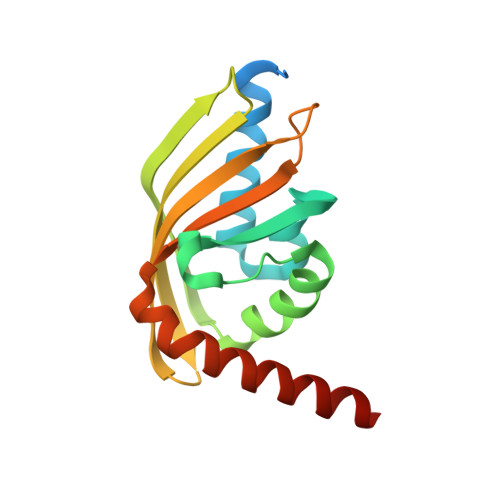Structural Basis for Isomerization Reactions in Fungal Tetrahydroxanthone Biosynthesis and Diversification.
Yang, J., Mori, T., Wei, X., Matsuda, Y., Abe, I.(2021) Angew Chem Int Ed Engl 60: 19458-19465
- PubMed: 34180120
- DOI: https://doi.org/10.1002/anie.202107884
- Primary Citation of Related Structures:
7F0O, 7F0Y, 7F0Z, 7F10, 7F11, 7F13, 7F14 - PubMed Abstract:
The novel isomerase NsrQ, from Aspergillus novofumigatus, is a key enzyme in the biosynthesis of fungal tetrahydroxanthones and is responsible for dearomatizing cyclization to provide a tetrahydroxanthone scaffold. NsrQ catalyzes a two-step isomerization reaction, involving the isomerization of allylic alcohol and subsequent inversion of configuration at the methyl group. We report on the biochemical and structural characterizations of NsrQ, and its homologue Dcr3, from Diaporthe longicolla. The crystal structures of NsrQ and Dcr3 revealed their similar overall structures, with a cone-shaped α+β barrel fold, to those of the nuclear transport factor 2-like superfamily enzymes. Furthermore, the structures of Dcr3 and NsrQ variants complexed with substrate analogues and the site-directed mutagenesis studies identified the catalytic residues and the important hydrophobic residues in shaping the active site pocket for substrate binding. These enzymes thus utilize Glu and His residues as acid-base catalysts. Based on these observations, we proposed a detailed reaction mechanism for NsrQ-catalyzed isomerization reactions.
- Graduate School of Pharmaceutical Sciences, The University of Tokyo, 7-3-1 Hongo, Bunkyo-ku, Tokyo, 113-0033, Japan.
Organizational Affiliation:

















